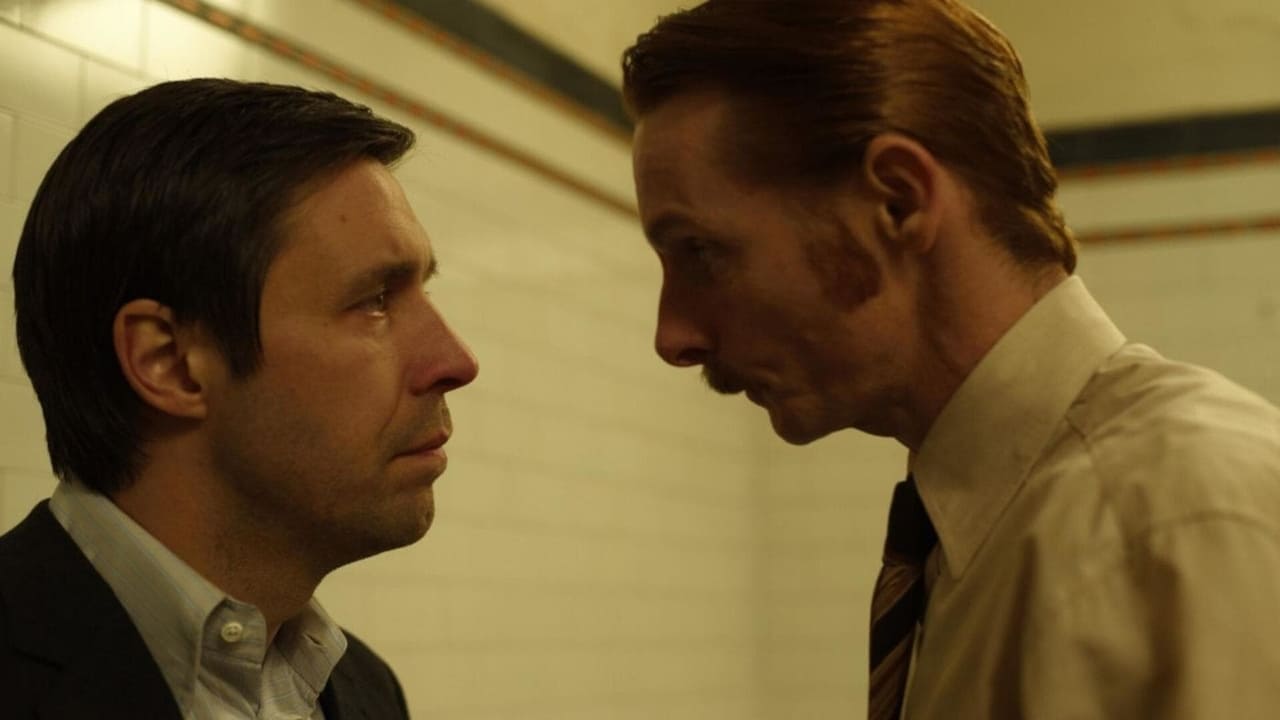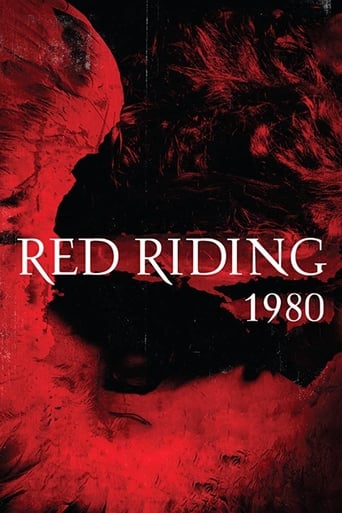

Stylish but barely mediocre overall
... View MoreStory: It's very simple but honestly that is fine.
... View MoreOne of the worst ways to make a cult movie is to set out to make a cult movie.
... View MoreThis movie feels like it was made purely to piss off people who want good shows
... View MoreA binge watching of RED RIDING TRILOGY, three TV movies adapted from David Peace's RED RIDING QUARTET, where its second chapter 1977 is skipped. Directed by three different directors in three different formats: 1974 by Julian Jarrold in 16mm film, 1980 by James Marsh in 35mm film and 1983 by Anand Tucked with Red One digital camera, the trilogy forebodingly trawls into the organized crimes and police corruption in West Yorkshire through the prisms of three different protagonists while they are wrestling with a series of murder cases, and overall, it inspires to achieve a vérité similitude of the bleak milieu while sometimes being mired with its own navel- gazing, such as narrative banality (1974), over-calculated formality (1980) and poorly indicated flashback sequences (1983). The police corruption which disclosed in 1974 turns out to be just a tip of a humongous iceberg, in 1980, after the inaction of the current head Bill Molloy (Clarke), our protagonist is Assistant Chief Constable Peter Hunter (Considine, in an atypical clean-cut appearance), who takes up the gauntlet to investigate the notorious Yorkshire Ripper case (inspired by the real events), which has already claimed a dozen lives, mainly female prostitutes. But soon he will meet more resistance and pressure from within the police department when he is tipped that one of the victims might not be the ripper's work. The tension retains in a high-strung tenor when we see a diligent Peter being taunted by the reprobates on a daily base, in particular from officer Bob Craven (Harris, reprised his role from 1974, and he is so delectably sinister through and through), the lowest scum of the earth. There are some gnawing hitches mined in the narrative, a key confessor is timely dispatched when he refuses to divulge the information on the phone but also has no intention to meet Peter in the hotel where he stays, instead, he asks Peter to come to his home in the witching hour, only to a sorry outcome. Also, it is unwarranted for Peter to appoint Helen Marshall (Peake), his former adulteress, into his team, to further complicate his scrape, plus a superfluous subplot of his broody effort is ironically dismissed by Helen's unsolicited abortion. After finally revealing the bloody picture of that singular murder (not done by the ripper), which connects to the finale of 1974, the story again, sets up a chilling twist to be brutally honest about to which rank extent the forces of law and order has been sullied.
... View MoreVicious, disgusting, more than gory, just gross, and yet so true to "life" if this is life. It sure is Yorkshire, accent, desolation and misery (more than plain and simple poverty), cruelty, pollution, greed, vice, perversion, etc. spread all over. All evils in one pouch, one bag in West Yorkshire and the motto that "this is the north, where we do what we want," that's the great beauty of ugliness.It will take you three long episodes to reach the culprit and you won't be surprised at all when you finally come to him. In the meantime the police would have revealed itself the most odious, ferocious and mentally cannibalistic institution you can imagine. Asking a question for them is necessarily hurting, torturing and a few other things of the sort: breaking fingers, crushing burning cigarettes anywhere you can imagine, stripping the suspects naked, and the films do not show them naked (prudes!). There is not one single person in the police force that is able to do anything regular like find a culprit that is really guilty and bring that one to justice. One journalist is driven to craziness and some deadly justice enforcing spree, and yet you will know if he was right in his choice of targets at the end of the third film. Another young man, slightly spaced out will be convinced under duress by everyone, probably only in the police, that he killed the girl. And he will end his life in prison. With little chance to be retried since he signed a confession and pleaded guilty.And quite a few are questioned that way and yet the crimes are going on: kidnapped girls, then raped, and in many ways cut up and carved up and more or less endowed with wings and feathers. And all that in a society that is rotten to the core, that speculates on the death of as many people as possible with pollution and the exploitation of them as long as they live with projects that are as crazy as they are greedy of shopping malls with cinemas and all kinds of entertainments to empty the billfolds of the gullible submissive slaves of the public till they are empty and they can then commit suicide or die young of any kind of hazardous escaping tentative or industrial pollution. And for the girls and women prostitution and promiscuity are the main two udders of everyday suspended death. You can imagine what the other two are.And be sure that all the cadres of the police and the most respected people in this society, lay and clerical, are among the small circle of speculators and their only aim is to make money and thus to keep the surrounding society going because you cannot squeeze money out of marginal miserable derelict and impoverished proletariat. No matter what, they must have just a little bit more than their basic needs to be able to spend that little bit more in the traps of the entertaining plotters.Is it a great trilogy? I do not know but one thing is sure even if at the end the killer is finally put out of the way all the corrupted elite of this part of Yorkshire will not be in any way even questioned, not to speak of prosecuted. After all corruption is the basic human dimension: the survival instinct of the more corrupted declared the fitter, by all means, even selling their parents into slavery and feeding their own children to the industrial sharks of our certainly not post-modern society but definitely pre-modern jungle.Dr Jacques COULARDEAU
... View MoreThe second part of the trilogy takes a similar approach to the first film in that it sets us up with a serial killer (this time the Yorkshire Ripper) but really is more interested in the crimes going on behind the scenes with the police and politicians. In this case I think I enjoyed the film more than the first one because I was aware of this and, although I was interested in the hunt for the Ripper, I knew to almost try to focus away from it. This is a strange feeling and it is one that I still think I struggle with on this second film – that basically the main text of the film is actually subtext and vice versa. This film makes this particularly true since the resolution of the Ripper story barely makes a ripple whereas the film ends with an almighty splash that is sure to bring me back for the final film.This almighty splash is all the more important because for the most part the film moves quite slowly and every that occurs seems to be suggested between the words. This makes for a good tense atmosphere even if it doesn't exactly get the pulse racing. This slow burn is quite satisfying though and, like I said, with my understanding of the direction more in place, I found it more engaging. This isn't to say it is perfect though and I still am a little confused by the universal acclaim for this film and the 10 out of 10 gushing that many here on IMDb have delivered. The slow delivery adds to the feeling of a deep, complex tale which to be honest the material here doesn't fully support. Unlike the first film at least the pacing is better and I didn't feel like we were in a race but rather than it played out as it should, although having never read the books I am not sure if this came at a cost to the source material.The heavyweight cast certainly helps the film and they fit the serious tone of foreboding pretty well. I'm sure Considine has been bad at some point but not in my memory and certainly not here; he is convincing in his underplaying and he makes for an engaging lead. Morrissey, Carter, Harris, Pitts and others all fill out the cast really well, again with performances that fit the tone and pace of the film well. If there is a fault it is that they are all very uniform in their characters and there is perhaps too much consistency in the "grim op norf" performances, but still.1980 improves on the first film, partly by virtue of being better paced but also partly by the viewer (me) now having the context as to what the film is really about rather than what the plot summary suggests. It is grim and engaging even if it isn't the most thrilling and it ends with a very satisfying conclusion that will bring me back for the final film.
... View MoreThe second installment in the Red Riding Trilogy set in 1980, is even better than the excellent first part. The putrid corruption of the West Yorkshire police is , if possible, more pronounced three years later. Their sheer incompetence is easily revealed during the desperate search for the Yorkshire Ripper,diabolical serial killer praying on prostitutes. The atmosphere of the second part of the trilogy is as a gloomy and depressing as ever,not unlike the lives of the unfortunate souls unlucky enough to end up in this hellhole of a place. I am eagerly awaiting the ending of this harrowing story in one of the best TV project I've seen after the legendary " Prime Suspect".
... View More